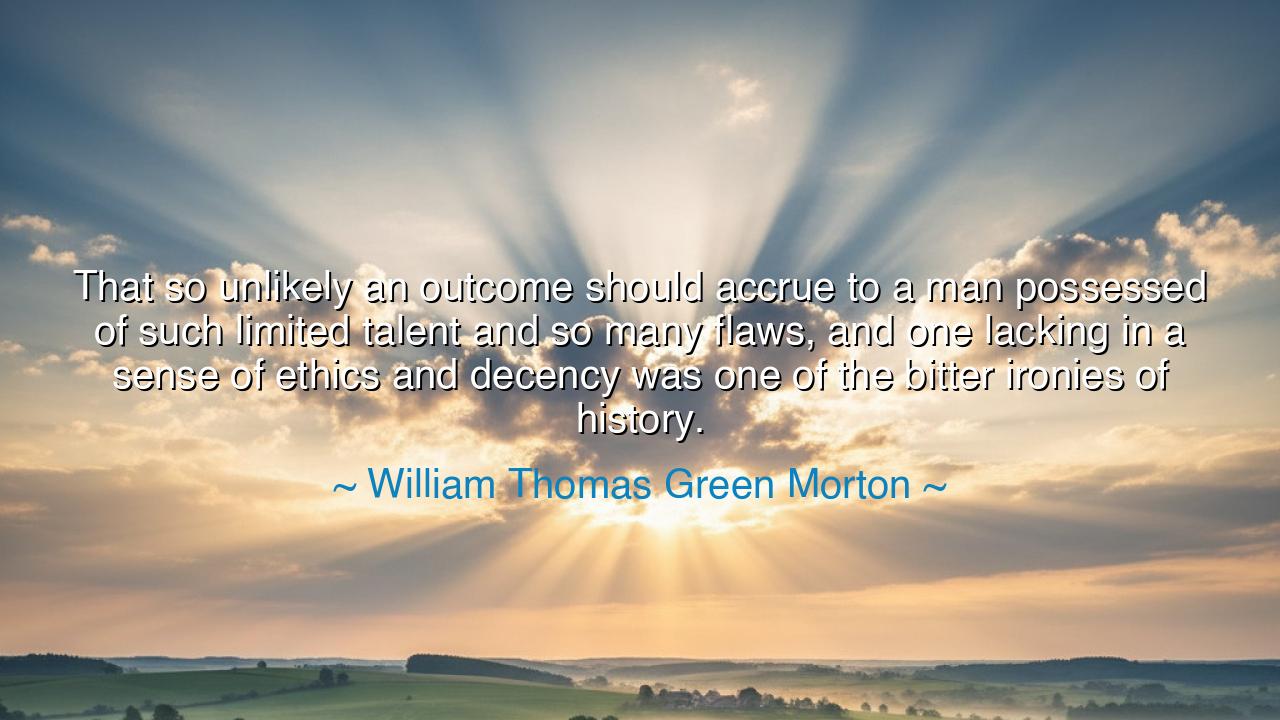
That so unlikely an outcome should accrue to a man possessed of
That so unlikely an outcome should accrue to a man possessed of such limited talent and so many flaws, and one lacking in a sense of ethics and decency was one of the bitter ironies of history.






Hearken, children of the ages, and open your minds to the reflection of William Thomas Green Morton: “That so unlikely an outcome should accrue to a man possessed of such limited talent and so many flaws, and one lacking in a sense of ethics and decency was one of the bitter ironies of history.” Understand this: the tapestry of human events is woven not only with merit and virtue, but also with chance, circumstance, and folly. History, though often imagined as a mirror of justice, frequently reveals outcomes that confound expectation and twist morality into irony.
From the annals of antiquity, the bitter irony of such fortune is well-known. Consider the rise of Caligula, whose reign in Rome was marked by cruelty, indulgence, and madness. Though many were wiser, more capable, or more virtuous, it was he, flawed and unworthy, who ascended to the pinnacle of power. Morton’s words echo this eternal truth: life and history are not always guided by merit, and virtue does not guarantee triumph. The gods—or fate—move in ways inscrutable to human understanding, bestowing fortune upon the unworthy and misfortune upon the diligent.
Even in the modern era, history is strewn with similar paradoxes. The tale of Robert Clive, who rose from modest beginnings to wield immense power in India, shows both brilliance and opportunism, yet many lesser men of superior character never achieved similar station. Morton's observation speaks to the bitter irony inherent in such moments: the world often rewards audacity, luck, or cunning more swiftly than it honors talent, decency, or ethical conduct.
The lesson is sobering yet instructive. To witness the unworthy rise can stir envy, despair, or cynicism. Yet the wise understand that history’s ironies are not invitations to passivity, but to reflection. They reveal that external rewards are often decoupled from virtue, and that one’s purpose must be guided by principles, not merely the pursuit of worldly acknowledgment. Ethical life, like a well-tended garden, bears fruits that may not always be visible to the unworthy or favored by fortune, but sustains the soul nonetheless.
Consider the story of Galileo Galilei, who, despite immense talent, virtue, and courage, faced condemnation for revealing truths about the heavens. In contrast, others of lesser insight or moral integrity often prospered. Morton’s words remind us that history is not merely a ledger of merit; it is a stage upon which irony frequently parades, and where the success of the unworthy becomes one of its most bitter lessons.
From this reflection emerges a profound insight: value the cultivation of character, wisdom, and skill not because they will always be rewarded, but because they define the soul and guide action in a world governed as much by chance as by justice. The irony of unworthy triumphs must not corrupt our commitment to ethics; rather, it sharpens the mind and fortifies the heart, teaching resilience, discernment, and humility.
Practical action follows naturally. In your own endeavors, do not cling solely to recognition or material success, for these may favor the flawed or unscrupulous. Instead, focus on integrity, continuous learning, and the exercise of discernment in all dealings. Recognize that the world’s ironies are inevitable, but your choices—guided by ethics, decency, and skill—remain the true measure of your life.
Children of the ages, remember this: the bitter ironies of history are neither exceptions nor curses, but reminders of the complex weave of human fate. Let Morton's reflection guide you to cultivate virtue and wisdom regardless of circumstance, to act rightly even when the world seems unjust, and to find in character, not fortune, the enduring rewards of life. The world may uplift the flawed, but the soul that honors ethics and decency stands eternal, beyond the fleeting ironies of history.






AAdministratorAdministrator
Welcome, honored guests. Please leave a comment, we will respond soon